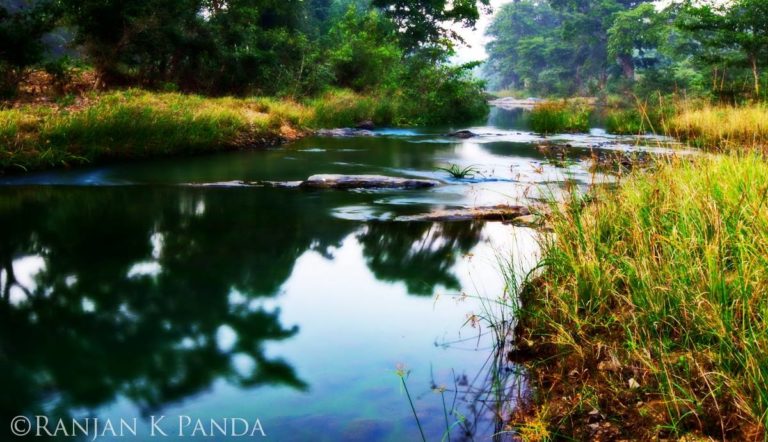
Ranjan Panda in the Mahanadi River Waterkeeper, based in Odisha, India.
India’s Mahanadi River Waterkeeper Ranjan Panda has started an initiative to resolve a conflict between the states of Chhattisgarh and Odisha over water withdrawals from the Mahanadi River, India’s sixth largest and the “mother river” of both states. Below is his account of the conflict and his efforts and that of other civil society groups to resolve it and save the Mahanadi.
This past June, water scarcity worsened in Odisha and the government there realized that upstream development projects in Chhattisgarh were one of the prime causes of the Mahanadi River’s sharply diminished flow. Suddenly, something that I had been asking the governments of the two states to consider for over a decade – namely, to treat the Mahanadi as a single ecological entity and plan all development projects in a coordinated and integrated way so that the mother river of both states did not suffer –became the most important political issue for the state of Odisha. The result was a brewing conflict between the two states that grew more heated and acrimonious by the day.
It was clear to me that what was needed was a citizen’s drive to pressure the two states to resolve the conflict in a way that benefited all parties, hence the Mahanadi Peace Initiative. Perhaps the first initiative of its kind in India – because of our determination for it to be neutral and apolitical – it calls on both the governments and the citizens of the two states to deal with the real challenges a dying river faces.
The river is struggling to survive due precisely to the exploitation of its waters without any holistic management plan that considers its ecological carrying capacity. In fact, the governments of the two states have been in competition to give away water to attract investments in coal-fired power plants and other water-guzzling industries. As a result of which, the riparian rights of common people are being affected negatively. The entire Mahanadi River basin is facing large-scale ecological degradation by mining and other industrial practices and by rapid urbanization. But neither state was discussing this. The debate around the extraction of water resources for various sectors largely assumed that the river could be an endless source of water. As a result, there has hardly been any basin recharging, and rejuvenation efforts by successive governments and the political debate has not included that either.
“Climate change is another real and increasing threat for the basin. A recent technical study has concluded that the basin’s water yield has been reduced by a huge 10 percent in recent decades owing to decreasing monsoon rainfall due to climate change.
The Mahanadi Peace Initiative is now reaching out to both the state governments, the central government and, most importantly, the people of the entire basin to garner their support for a proper dialogue between the two states so that the Mahanadi’s health can finally be discussed and attention is not diverted to political mud slinging. The initiative calls for the real issues to be at the forefront of the debate.
Indian water laws on inter-state river water disputes are toothless, and the mechanisms to plan coordination of inter-state basin management are also weak. A lot needs to be debated and brought into perspective on this front, too. We have planned a lot of actions to strengthen river-management policies and practices for the Mahanadi that can help build a national dialogue on the subject.
“So far, we have received over 2,000 endorsements for the initiative from across the country. Several Waterkeepers from other parts of the world have also voiced their support for our efforts. Villagers, civil society organizations, political leaders, academics, journalists, farmer leaders, technical experts and many more people have pledged their support already. Our request for endorsements is open and we expect many more hands to join us in the near future.
At a coordination meeting organized between members of the Mahanadi Peace Initiative from both the states of Odisha and Mahanadi, a plan of action was sketched out to reach out to hundreds of thousands of people through various means. We want to re-connect the people of Chhattisgarh and Odisha to their mother river and to join us in the fight to save it from dying. We want dialogue, not war!
Overall objectives of the Mahanadi Peace Initiative are as follows:
– To connect people of the basin to the real challenges such as water reduction due to dams, growing conflicts, diversion of water from irrigation to industries, climate-change impacts on the basin, loss of livelihoods of farmers and fisher folks, etc.
– To build awareness on the decreasing health of the river basin due to pollution from industrial, urban and other activities.
– To garner people’s support to the “Mahanadi Peace Initiative” and, with their support, urge both the state governments to enter into a peace building dialogue without further delay.
– To urge upon both the governments to prepare a joint River Basin Management Plan and work towards recharging the river basin through proper ecological planning and enable people’s rights over the river.
– To urge both the governments to prioritize drought-proofing the basin, providing clean drinking water to the entire basin population, water security to farmers through complete irrigation coverage, providing sanitation facilities with water security to the entire basin population, revive and restore surface water bodies as well as ground water sources.